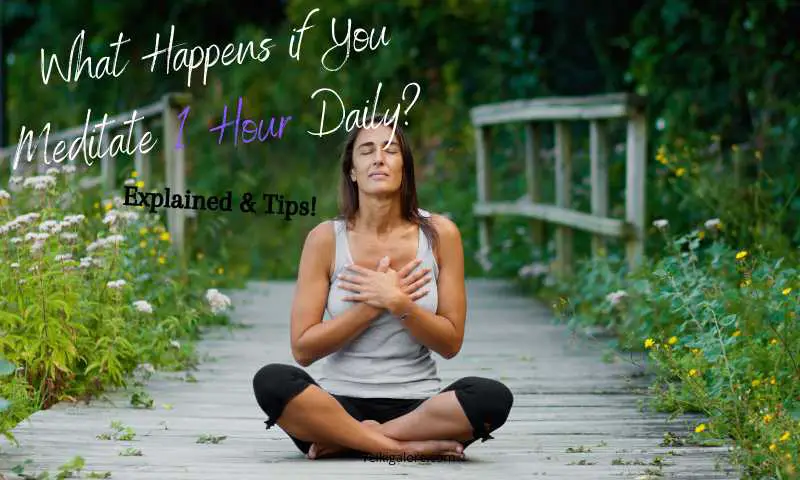Are you curious to find out what can happen if you commit to a daily meditation practice?
Read on to learn how your life may be transformed with just 1 hour of mindful meditation every day.
Meditation is a practice of focusing on the present moment in an effort to increase awareness, reduce anxiety and cultivate inner peace.
Becoming a regular meditator has long-term benefits, but even a few minutes of mindful practice can have an immediate effect on the mind and body.
Making time to meditate each day is one way to experience some of these short-term benefits more quickly.
Consistently practicing meditation for even just 20 minutes per day can deepen your experience, however, the amount of time you practice is not as important as tuning into your present state of being.
Research shows that just 10 minutes a day can lead to improved physical health, mental well-being, and emotional stability over time.
Moreover, meditation has been shown to assist with concentration, stress reduction, and anxiety relief—all of which are essential for leading a healthy life well beyond our 20s and 30s.

Benefits of Meditation
Meditation is a practice of mindfulness, awareness, and connection with the present moment.
It has been celebrated in many cultures throughout the world for centuries and is still widely practiced today.
The benefits of meditation range from reducing stress and anxiety to improving cognitive function and overall mental well-being for many people.
One hour of meditation daily can have profound effects on the mind and body; it can:
-Decrease stress levels: Regular meditation practice can help you cultivate an inner sense of peace and well-being, allowing you to manage your stress more effectively.
-Increase focus and concentration: When practiced regularly, meditation can improve your ability to maintain focus while eliminating distractions (if you feel distracted sometimes while meditating, This article might help you!).
-Enhance introspection: Through increased self-reflection during meditation sessions, it is easier to gain clarity on difficult decisions or issues that you are facing.
-Improve cardiovascular health: Meditation can help lower blood pressure and reduce resting heart rate, leading to improved heart health over time.
-Grow self-awareness: One of the most powerful tools for personal development is self-awareness—the ability to understand our emotions, behaviors, motivations and intentions with greater clarity.
-Reduce anxiety symptoms: Engaging in regular mindful breathing practices can lead to decreased levels of cortisol—the hormone associated with stress—which leads to improved mental health over time.
-Boost creativity: By engaging in deep reflective practices during your daily meditative routine, your imagination will be activated allowing for more original ideas to flow effortlessly from within you.
How to Meditate 1 Hour Daily
Getting started with meditation is not as hard as it may seem. In fact, beginning a regular meditation practice can be quite simple.
All you need is the right attitude and the commitment to make it part of your daily routine.
Here are some steps you can take to begin a successful meditation practice:
Find a comfortable place to sit. Whether this is outdoors in nature or inside a quiet room, make sure you can sit with your back straight and your legs crossed for at least 15-20 minutes.
Begin each session by taking some deep breaths and focusing your attention on inhalation and exhalation.
This helps align your body and mind so that when you eventually settle into stillness, you will be better able to recognize subtle changes that occur during the practice.
Set an intention for the session – whether this is simply having an open mind or working on a particular area of focus such as compassion or forgiveness, give yourself something to aim for during each session so that the experience has purpose and meaning..
Once settled into a comfortable position, begin by silently observing whatever thoughts are present without judgment or resistance – this is a skill known as mindfulness which develops gradually but improves with regular practice.
When thoughts drift away from your point of focus (i.e., breathing), bring them gently back without any sense of frustration or guilt – once again without judgment simply observe what arises in each moment without attaching any meaning or importance to them..
As more distractions arise throughout the session strive to remain relaxed, open, yet focused – if necessary take some time out when needed but don’t give up!
With persistence eventually, even fleeting thoughts become less frequent which allows for greater peace within ourselves..
At the end of each session take note of how it felt either mentally or physically and use this information adjust future practices accordingly knowing there’s no such thing as “perfection” just refinement over time!.
Go easy on yourself during each step along the journey Enjoy the process!
Recommended – What Is Heartfulness Meditation?
The Science Behind Meditation
The scientific basis of meditation as an effective mental health tool is well established.
Researchers have uncovered evidence that regular meditation not only reduces stress and anxiety but also improves well-being and quality of life.
Studies have also suggested that meditating can help individuals to cultivate positive emotions, increase perceived control over behavior, increase self-awareness and reduce mind-wandering.
Regular meditators report a calmer state of mind during the practice itself, containing elements such as a greater ability to focus attention, increased body awareness, and a greater level of emotional regulation.
Studies have found that these effects extend beyond the practice session itself and meliorate the practitioner’s overall mood in everyday life.
An increasing body of evidence suggests that daily meditations may cause structural changes in the brain over time; potentially including increased gray matter concentration in areas associated with learning, memory formation and emotion regulation.
Similarly, different types of meditation induce unique brain activity patterns at rest—both during actual practice sessions and after long-term study periods.
It’s possible for anyone to reap similar benefits from just one hour of mindful meditation every day.
Simple breathing exercises can be done quickly with no special equipment — all you need is yourself!
Over time, this type of habit leads to improved emotional resilience through self-reflection techniques, allowing one to better regulate one’s emotions and manage stress more effectively.
Types of Meditation
Many people are familiar with the concept of meditation and its associated benefits, but the practice of meditation actually encompasses a range of different meditation techniques which each have their own unique approach to relaxation and physical, mental, and spiritual well-being.
It is important to understand the types available so that you can determine which methods best suit your goals.
The main types of meditation are:
-Mindfulness Meditation: this type of meditation focuses on maintaining awareness in the present moment.
Mindfulness involves paying attention to your thoughts, feelings, bodily sensations, and surrounding environment in an accepting and non-judgmental way.
-Sound Meditation: This type of meditation uses certain sounds or mantras to help calm and relax the mind.
The sound acts as a point for focus and allows for space for contemplation.
-Transcendental Meditation: This type of meditation uses a chanting mantra to create an immersive emotional experience that promotes deep personal transformation creating lasting mental clarity and emotional stability.
-Movement Meditation: Movement meditations involve coordinating specific movements with breath in order to move energy through the body allowing for deeper relaxation and physical benefits like flexibility and improved posture.
Examples include yoga, qigong, and tai chi.
-Guided Visualization Meditation: In this method, participants imagine peaceful scenes while being guided by a narrator or presenter typically utilizing specific breathing techniques and visualizations such as symbols, colors, or landscapes to bring about relaxation and inner peace.
No matter which technique you choose, regular meditation practice offers great potential benefit when practiced consistently — even just one hour per day!
Tips for Practicing Meditation
Daily meditation is a simple practice that can bring about profound benefits, but beginners often don’t know where to start.
Here are some tips for getting the most out of your daily meditation practice.
- Develop a regular routine and stick to it. Meditating for just five minutes every day is better than meditating for an hour only occasionally – regularity is key. Try setting aside five or ten minutes each morning and evening and make it part of your daily routine.
- Find a comfortable position that allows you to remain alert yet relaxed. Sitting up with your spine straight is usually considered the best position, however, it’s okay to lie down or to be in a comfortable chair if you prefer – as long as you stay alert and prevent yourself from drifting off into sleep!
- Use a timer or keep track of time in some other way so that you can feel free to relax deeply without worrying about how much time has passed by or feeling pressure to finish quickly. Concentrate on the here and now, rather than focussing on when your session will end!
- Focus on your breath as often as possible, calming it with each exhale and trying not to get distracted by thoughts – even if they seem important or interesting at first! If distracting thoughts come up often during practice, try using a word or phrase that has meaning for you (e.g., “calm”) in order to maintain focus on the breath instead of following rabbit holes of thought down into unnecessary places.. Developing this skill will pay huge dividends in everyday life outside of meditation too!
- Open yourself up by trying something different once in a while – try sitting outdoors, meditating with friends, extending your sessions beyond twenty minutes, etc – this will help keep the practice alive, and interesting and prevent getting stuck in unhelpful ruts.
- Enjoy savoring every moment more deeply – this too is an invaluable asset as we move through everyday life.
Conclusion
In conclusion, meditating for 1 hour a day can bring about numerous health benefits such as increased focus, improved mental clarity, and relaxation.
It can also help to reduce stress levels and increase feelings of connectedness to yourself and the world around you.
There are many different methods of meditating that can be used, allowing everyone to find the methods most beneficial for them.
While it may take time before any results are noted, with consistent practice throughout each day, these results will eventually become noticeable.
Taking time out of your day to meditate is an important way to not only stay healthy but also improve overall well-being.



